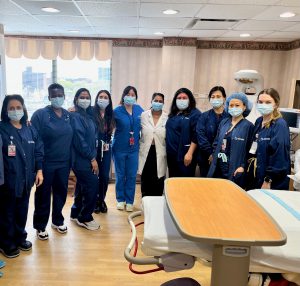 Flushing Hospital Medical Center is the proud recipient of the New York State Obstetric Hemorrhage Project 2021 Quality Improvement Award.
Flushing Hospital Medical Center is the proud recipient of the New York State Obstetric Hemorrhage Project 2021 Quality Improvement Award.
The award recognizes Flushing Hospital’s participation and dedicated work in the New York State Obstetric Hemorrhage Project which was created by the New York State Perinatal Quality Collaborative (NYSPQC) to reduce maternal morbidity and mortality associated with obstetric hemorrhage.
Maternal morbidity is defined by the U.S. Department of Health and Human Services as, “any short- or long-term health problems that result from being pregnant and giving birth.” While maternal mortality, “refers to the death of a woman from complications of pregnancy or childbirth that occur during the pregnancy or within 6 weeks after the pregnancy ends.”
Both issues have been causes for concern nationally as data shows that maternal morbidity and mortality rates in the U.S. have been inclining steadily.
In November of 2017, the NYSPQC initiated the NYS Obstetric Hemorrhage Project in collaboration with the American College of Obstetricians and Gynecologists, the Healthcare Association of New York State, and the Greater New York Hospital Association with the support of the National Institute for Children’s Health Quality to address this problem.
Flushing Hospital joined the project as part of its ongoing efforts to provide patients and their families with the best, safest, and most equitable care.
As a participant, Flushing Hospital has met or exceeded the project’s goal of assessing at least 85% of patients for risk of obstetric hemorrhage upon admission and during the postpartum period. The hospital also implemented measures to improve readiness to respond to obstetric hemorrhage.
“This project involved a multidisciplinary approach with monthly webinars and in-person meetings in Albany. Together, we worked on updating our policies, acquired a hemorrhage cart, and updated our hemorrhage kit. We also performed simulation drills and devised a hemorrhage assessment for patients antepartum, upon admission to Labor and Delivery, and postpartum. Our team has been educated and trained on all changes to ensure the delivery of quality care,” explained Maria Smilios, Director of Nursing Maternal and Child Services at Flushing Hospital.
Flushing Hospital was commended for its dedication and “exemplary work” by the New York State Perinatal Quality Collaborative. The hospital will continue to focus on improving maternal morbidity and maternal rates in its community to ensure a healthier future for all.


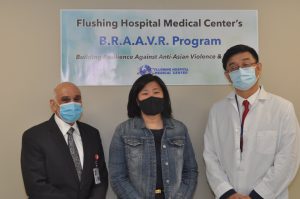 Since the beginning of the pandemic, there has been a significant increase in the number of verbal and physical acts of violence against members of the Asian American and Pacific Islander communities. According to a recent NYPD report, there were 131 hate crimes targeting Asians in New York in 2021 as compared to only 28 in 2020 and only one in 2019.
Since the beginning of the pandemic, there has been a significant increase in the number of verbal and physical acts of violence against members of the Asian American and Pacific Islander communities. According to a recent NYPD report, there were 131 hate crimes targeting Asians in New York in 2021 as compared to only 28 in 2020 and only one in 2019.
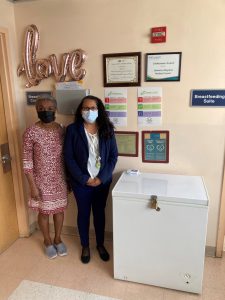 Jamaica Hospital Medical Center, which operates the only milk depot in Queens, was asked to discuss this topic with the media in an effort to provide important information about how women can donate (and potentially receive donor breast milk) and provide safety tips on substitute feeding methods. Ivis Penalver, a certified lactation consultant and Assistant Director of WIC conducted two separate interviews, one with Spanish broadcast television station Univision and the other with WPIX 11 news.
Jamaica Hospital Medical Center, which operates the only milk depot in Queens, was asked to discuss this topic with the media in an effort to provide important information about how women can donate (and potentially receive donor breast milk) and provide safety tips on substitute feeding methods. Ivis Penalver, a certified lactation consultant and Assistant Director of WIC conducted two separate interviews, one with Spanish broadcast television station Univision and the other with WPIX 11 news.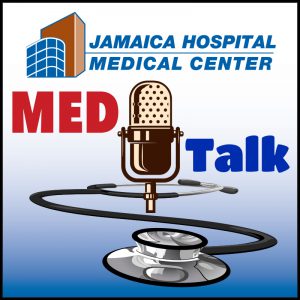
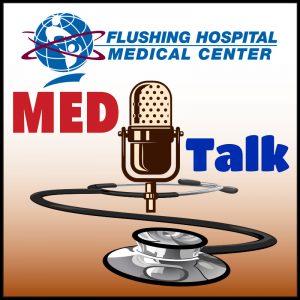 The first podcasts, which are named Jamaica Hospital MedTalk and Flushing Hospital MedTalk began production earlier this year. Each episode is approximately 15-minutes-long and features providers from various medical specialties discussing a wide range of topics.
The first podcasts, which are named Jamaica Hospital MedTalk and Flushing Hospital MedTalk began production earlier this year. Each episode is approximately 15-minutes-long and features providers from various medical specialties discussing a wide range of topics.  In collaboration with hospitals across the state, the MediSys Health Network is conducting a Community Health Needs Assessment survey to determine the most important health concerns of the community, and we would greatly appreciate your input.
In collaboration with hospitals across the state, the MediSys Health Network is conducting a Community Health Needs Assessment survey to determine the most important health concerns of the community, and we would greatly appreciate your input.
















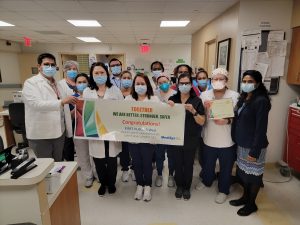 This year, Patient Safety Awareness Week was observed from March 13th to the 19th. The annual observation was created to raise awareness of the importance of safety in healthcare.
This year, Patient Safety Awareness Week was observed from March 13th to the 19th. The annual observation was created to raise awareness of the importance of safety in healthcare.
















